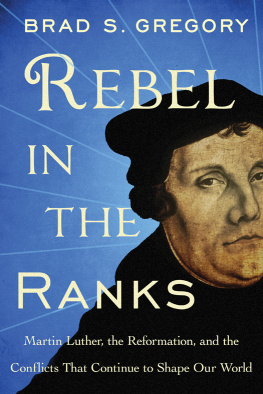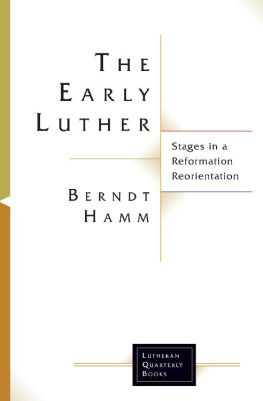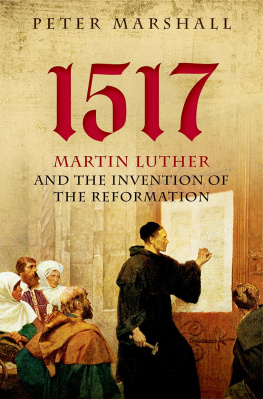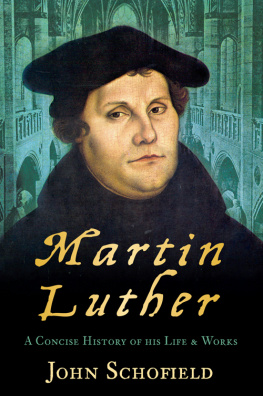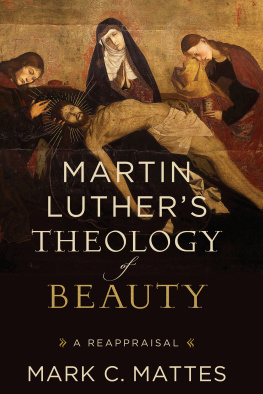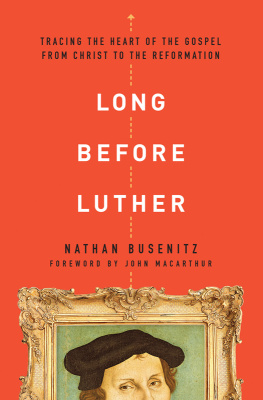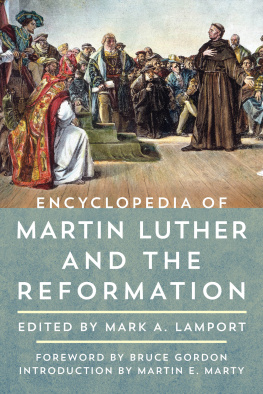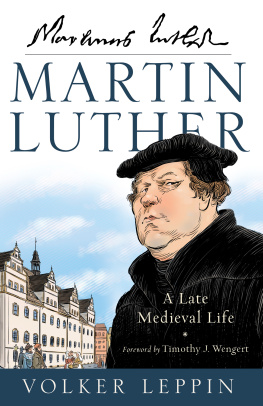T HIS IS A BOOK about the Reformation and why it still matters. Regardless of our own religious views, the Reformation remains important because we cant understand secular and religious ideas and institutions today without it. What happened five centuries ago affects us today. If we want to know why the early twenty-first century is the way it isand how it got this waywe need to understand the Reformation and its impact. The Reformation ended the Middle Ages and made the modern worldbut not in any simple or straightforward way.
Much of the Reformations influence remains indirect and unintended. This is a major theme of this book. Protestant reformers five centuries ago were not heralds of modern individual freedom and autonomy. Neither did they envision modern democratic states or advocate for consumer capitalism. They did not support modern religious toleration or champion the modern separation of church and state. And yet we cannot understand any of these ideas, institutions, or practicesor many otherswithout a proper reckoning of the Reformation and its enormous effects.
Martin Luther would be horrified by most of the long-term outcomes of the Reformation, as would John Calvin, the other most influential Protestant reformer of the sixteenth century. Yet though horrified, they might not be surprised by how things have gone because they viewed human nature as utterly sinful apart from Gods grace. They and their colleagues were trying to reform what they regarded as terrible problems in the Church and, in the process, to make people and society more authentically Christian. In some areas of Europe, especially in the later sixteenth and seventeenth centuries, they perhaps would have thought they had succeeded. But they would be appalled if they could see how their actions led indirectly to a profound diminishing of Christianitys public influence in Western societies. The religious disagreements and conflicts that followed the Reformation set the stage for religions eventual separation from the rest of life. That too will be a major theme of this book. Its part of why the Reformation remains important, regardless of our opinions about the past or the present.
Seeing how this happened, and why the Reformation still matters today, means seeing how the Europe of five hundred years ago gradually and unintentionally was transformed into the modern world. One of the hardest things at the outset is to get a sense of what life then was like. Then as now, wealth was distributed with radical inequality, but we can hardly imagine how little wealth there actually was. Human life was more demanding, more difficult, and less comfortable. People lived closer to nature and to its daily, seasonal, and annual cycles.
Whether in Scandinavia, central Europe, or near the Mediterranean, the large majority of men and women lived in small villages. They were illiterate and worked by farming the land. The impressive surviving medieval churches, Renaissance city halls, and homes of wealthy merchants should not mislead us: especially in central and northern Europe, most buildings were made of wood and were vulnerable to fires, which occurred regularly. The materials, texture, and furnishings of buildings bore the marks of human crafting, devoid of modern industrial surfaces and finishes. People had little mastery of the natural world. Uncertain weather left them vulnerable to poor harvests. Epidemic diseases, above all the dreaded bubonic plague, constantly threatened. In part because medical care was largely ineffective, the average life expectancy was much shorter than today: to years at birth in England around 1500 , with few adults living beyond their fifties.
Traveling was difficult and frequently dangerous, and overland trade with heavy or bulky commodities meant expensive and cumbersome transportwhich is why grain, timber, wool, and cloth nearly always went by water, whether in ships that hugged the coastlines from the Baltic to the Mediterranean or in barges that navigated the many riversthe Rhine, Loire, Danube, Elbe, Po, and morevital to Europes trade. Even the fastest communications were slow: around 1500 , letters dispatched by courier from Brussels to Venice, for example, took ten days to arrive at their destinations.
Despite Europes overwhelmingly rural character, cities were disproportionately important as centers of trade, artisanal manufacturing, education, and culture. Still, Cologne, the largest city in the vast expanse of central Europe, had a population of only around ,, while Londons , residents were largely concentrated within a square mile. In fact, aside from London, before the Reformation England boasted only two towns with as many as , inhabitants.
In cities and villages alike, when the sun went down it got dark. There was no electricity, there were no gas street lamps. Paris, the largest city in all of Europe, with maybe , people, was lit at night with torches, as was every other city. And dark meant dangerous, which is why city dwellers guarded their urban walls night and day. In a world without professional police forces or standing armies, keeping out suspicious travelers and would-be intruders was a priority.
Besides these radical differences in the material conditions of life, religion held an utterly different place in society than it does in Western countries today. In our time religion is considered an individual choice, and that choice includes the option not to be religious at all. Religion today is a distinct area of lifeseparate from your career, professional relationships, recreational activities, consumer behavior, and so on. None of this was true in the early sixteenth century: religion was neither a matter of choice nor separate from the rest of life. Except for the Jews, who made up a tiny percentage of Europes population around 1500 , everyone became a Christian through being baptized with water; baptism was a prerequisite for the possibility of eternal salvation after death. Almost always baptism took place just days after birth. That way, if a baby diedas one in four did from disease or malnutrition before their first birthdayshe would be saved by God. Baptism was a rite of initiation into the local parish church and into the community in which you lived. Like the other sacraments, it also conferred Gods gracehis spiritual presence and power in and through the material world he had created. Except in emergencies when there was immediate danger of an infants death, baptism was administered by the local priest. He had joined the clergy through a special ritual of ordination, and his vow of celibacy and duty to administer the sacraments set him apart from laypeople, who made up the large majority of Christians.
A parish was coextensive with the local community; a small village would often be a single parish, while a city might include many parishes, each of them an urban neighborhood. Europe included tens of thousands of parishes reaching from Scandinavia to the Iberian and Italian peninsulas. Rural and urban parishes alike belonged to the Catholic Church, which had its administrative and symbolic center in Rome and was headed by the pope. Parishes were geographically organized into dioceses, the Churchs administrative units, each headed by a bishop responsible for overseeing all the parishes and priests in his diocese. For most Christians, however, the pope and even bishops remained remote figures. Local experience of the Church meant participation in a web of social relationships of family, kin, and neighbors linked by customs, rituals, and worship led by a priest.
Though for most Christians Rome lay far away, religion played a central role in everyday lifefrom the primary relationships between family and kin to the practice of politics and commerce. Social relationships and gender expectations were inseparable from Christian norms. And both public and private morality were conceived in Christian terms. Rather than standing apart from government or courts of justice, religion informed both politics and law. At the same time, Christianity was not aloof from the buying and selling of goods and pursuit of profit; Christian ethical teachings sought to shape economic transactions and restrain greed. Education, from the teaching of ABCs in humble small-town primary schools through instruction in one of Europes sixty or so universities, was imbued with Christian ideas. In short, religion included a lot more of life than religion includes today. Known as Latin Christendom, this social, political, intellectual, and cultural totality was the medieval predecessor of todays European nation-states.

